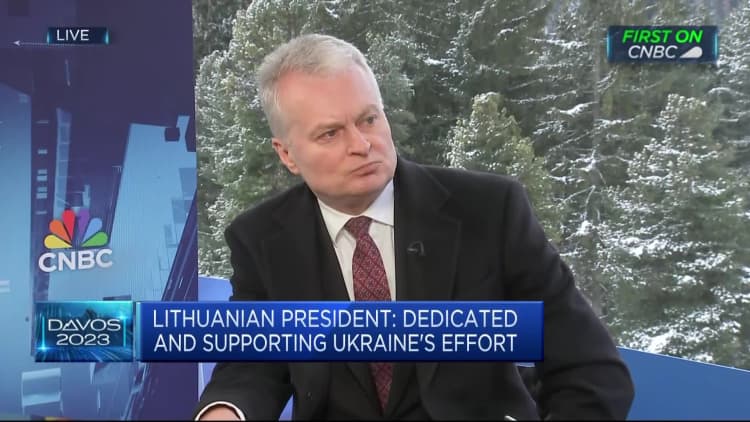[ad_1]
The development, from Lithuanian infrastructure firm Tech Zity, is inspired by British renovation projects like the Battersea Power Station and Tate Modern art gallery.
Tech Zity
Lithuania is building a huge tech campus — Europe’s largest — in the capital of Vilnius, as it looks to become the new tech capital of the Baltics.
Built by Tech Zity, an infrastructure project in Lithuania, the campus is a 100 million euro ($109.6 million) development that will span 55,000 square meters and house 5,000 digital workers, the firm said Friday.
That would make it larger than Paris’ Station F, currently the largest startup campus in all of Europe.
The development is inspired by British renovation projects such as the Battersea Power Station and Tate Modern art gallery.
Tech Zity developers will renovate a number of sewing factories in a disused industrial space in Vilnius’ New Town, maintaining factory-like office floors with ceiling heights of at least 7 meters.
The campus is aimed at encouraging Vilnius’ tech workers to come back to the office post-pandemic.
Tech Zity
The project aims to encourage Vilnius’ tech workers to return to the office after the pandemic. Tech companies have increasingly been pushing for their employees to go back to the office, in a reversal from the pandemic-era trend of working from home.
Lithuania’s growing tech scene
Lithuania’s tech ecosystem has grown dramatically over the past decade, Darius Zakaitis, Tech Zity’s founder, told CNBC.
“When I started 30 years ago, there were 200 people in the Lithuanian tech ecosystem,” Zakaitis said. “Now it’s 18,000 people.”
The development project is a restoration of old disused industrial space in Vilnius’ New Town, which is known as the hipster part of town.
Tech Zity
“It’s a result of 10 years of active young people building new companies every day. Some of them are very successful,” he said.
“Lithuanians are very productive, very results-oriented, highly-skilled guys, very aggressively building their own companies,” he added.
Vilnius, the second-largest city in the Baltic states, is home to a burgeoning tech industry, including major unicorns such as used clothing retailer Vinted and cybersecurity firm Nord.
Nord has its own 300-square-meter campus in Vilnius about 300 meters away from Tech Zity’s, while Vinted’s headquarters is roughly 200 meters away.
Tech Zity’s new campus will include co-living spaces, restaurants and bars, and cultural and educational facilities.
Tech Zity wants the campus to foster a buzzing night life as well as other socializing opportunities, incorporating co-living spaces, restaurants, and bars.
Tech Zity
“Vilnius is maintaining a firm position within the European tech scene thanks to rapid innovations and visionary businesses such as Tech Zity,” Valdas Benkunskas, the mayor of Vilnius, said in a statement Friday.
“Bursting with innovative entrepreneurs, multinational talents, and ambitious investors, the capital has grown to a modern tech hub that evokes bold ideas, successful collaborations, and people-focused solutions.”
Lithuanian tech companies make roughly 99% of their revenues abroad, he said. He added that the country’s tech scene models itself after Israel’s, which has produced numerous global tech successes, including self-driving tech firm Mobileye and the mapping app Waze.
Tech Zity manages three tech campuses in Vilnius, including Tech Park, Tech Loft, and Tech Spa, which are home to companies like Google, Bored Panda and Kilo Health.
The project is a huge undertaking — at 55,000 square meters, it is expected to be the largest tech startup campus in all of Europe.
Tech Zity
U.S. streaming platform Netflix has used Tech Zity locations for filming, including the docu-series “The Playlist” which focuses on Spotify founder Daniel Ek.
Currently occupying 20,000 square meters, Tech Zity plans to reach 80,000 square meters over time, considering new campuses, existing locations, and other projects.
Long way to go
Despite its recent successes, Lithuania is far from becoming a major tech hub that rivals the likes of the U.K., France or Germany.
The country attracted 222 million euros of venture capital funding in 2022, paling in comparison to its Western European peers. By contrast, U.K. tech startups raised $30 billion, while their French counterparts raised 13.5 billion euros.
But the country has been drawing more interest from venture capitalists, according to local founders.
“All the top VC firms are now coming to Lithuania and talking with startups, angel investors, and anyone else,” Tom, CEO and co-founder of Nord Security, told CNBC on the sidelines of the Web Summit tech conference in Lisbon, Portugal, last November.
“The last raise for a Lithuanian startup called Kevin was from Accel, Vineted has Insight Parnters, EQT, Accel, and many others.”
WATCH: Russia sanctions must go further, Lithuania’s president says

[ad_2]

